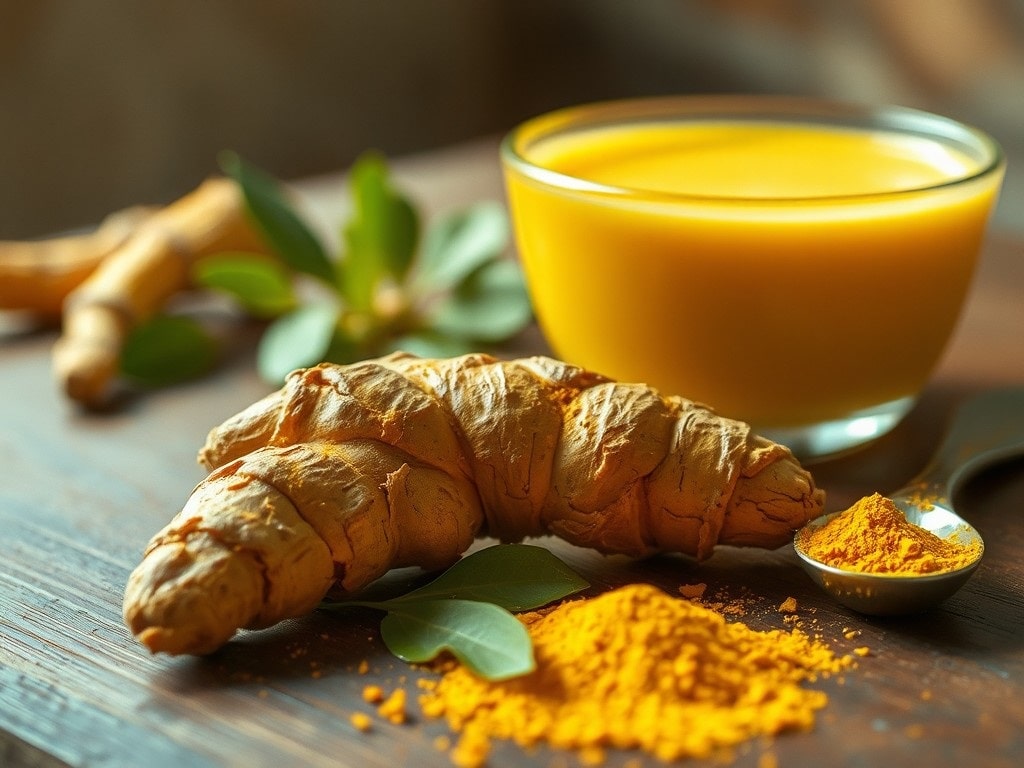How This Spice Supercharges Your Immune System
Turmeric, a golden-hued spice often associated with the rich, aromatic curries of South Asia, has long been celebrated for its medicinal properties. While it may have initially garnered attention as a flavorful ingredient in kitchens across the globe, this vibrant root, scientifically known as Curcuma longa, has recently emerged as a powerful ally for boosting the immune system. This article explores the science behind turmeric’s immune-boosting properties, shares compelling anecdotes, and provides practical insights on how to incorporate this spice into your daily routine.
A Spice with a History
Turmeric’s use in traditional medicine dates back thousands of years. In India, where the spice is a staple, it has been used not only in cooking but also in Ayurvedic medicine to treat a variety of ailments, from digestive issues to joint pain. Turmeric’s therapeutic reputation is primarily attributed to its active compound, curcumin. This yellow pigment, which gives turmeric its distinctive color, is believed to possess potent anti-inflammatory, antioxidant, and immune-modulating properties.
But it wasn’t until relatively recently that turmeric began to capture global attention. As modern science delved deeper into the world of bioactive compounds, researchers began to confirm what traditional healers had long known: turmeric is more than just a culinary delight — it’s a powerhouse for the immune system.
The Science Behind the Spice
The immune system is a complex network of cells, tissues, and organs that collaborates to protect the body from harmful invaders, including viruses, bacteria, and other pathogens. A well-functioning immune system is critical to good health, and one of the most effective ways to support it is through proper nutrition and lifestyle choices.
Curcumin, the active ingredient in turmeric, plays a pivotal role in this process. According to numerous studies, curcumin exhibits a broad spectrum of biological activities that enhance immune function. The compound is a potent antioxidant, meaning it helps neutralize free radicals — unstable molecules that can damage cells and contribute to chronic diseases, including immune-related conditions.
One of curcumin’s most remarkable properties is its ability to modulate inflammation. Chronic inflammation is thought to underlie many immune system dysfunctions, including autoimmune diseases and allergies. Curcumin, with its anti-inflammatory capabilities, has been shown to reduce levels of pro-inflammatory cytokines, signaling molecules that can cause excessive inflammation in the body.
But how does this translate into tangible benefits for your immune health? Let’s take a closer look.
Immune-Boosting Benefits of Turmeric
- Enhancing Antibody Production
Our immune system produces antibodies to recognize and neutralize pathogens, such as bacteria and viruses. Research suggests that curcumin can boost the body’s production of these crucial antibodies. In fact, a study published in the Journal of Clinical Immunology found that curcumin enhanced the production of immunoglobulins — the antibodies that form a key part of our immune defense.
This effect could be especially beneficial for individuals who are immunocompromised or susceptible to infections. By enhancing antibody response, turmeric could help the body recognize and fight off pathogens more effectively.
- Supporting the Gut Microbiome
The gut is often referred to as the “second brain” of the body, and for good reason. It plays a critical role in immune function, as approximately 70% of the body’s immune cells reside in the gastrointestinal tract. A healthy gut microbiome — the community of bacteria and other microorganisms that reside in the intestines — is vital for a robust immune response.
Turmeric has been shown to positively impact the gut microbiome, promoting the growth of beneficial bacteria while inhibiting harmful microorganisms. This balance supports a healthy immune system, as a well-functioning gut microbiome is essential for regulating immune responses and preventing inflammation.
- Boosting the Production of T-cells
T-cells are a type of white blood cell that plays a crucial role in identifying and attacking infected or cancerous cells. Curcumin has been shown to stimulate the production of T-cells, which can significantly improve the body’s ability to fight off infections. A study published in Immunopharmacology and Immunotoxicology demonstrated that curcumin could enhance the proliferation of T-cells, strengthening the immune system’s response to threats.
- Fighting Off Viral Infections
Given the rise of viral diseases in recent years, many are seeking natural ways to bolster their defenses against viruses. Curcumin has demonstrated promising antiviral properties in several studies. It has been shown to inhibit the replication of certain viruses, including the influenza virus, by disrupting their ability to bind to host cells. While it is not a substitute for vaccines or antiviral treatments, turmeric may help in reducing the severity and duration of viral infections when used as part of an overall immune-boosting regimen.
Anecdotes: Real-Life Stories of Turmeric’s Immune-Boosting Power
To illustrate the potential of turmeric in everyday life, let’s look at a few real-life stories where individuals have used turmeric to improve their immune health.
- Case Study 1: Jessica’s Battle with Autoimmune Disease
Jessica, a 35-year-old woman, had been living with rheumatoid arthritis for several years. Her immune system was mistakenly attacking her joints, causing inflammation and pain. After learning about turmeric’s anti-inflammatory properties, Jessica began incorporating turmeric into her diet. She added it to smoothies, curries, and even took turmeric supplements daily. Over time, she noticed a significant reduction in joint pain and swelling. Her doctors also reported improvements in her blood markers for inflammation. Jessica’s story is a testament to turmeric’s potential in modulating the immune system and reducing inflammation in chronic conditions. - Case Study 2: Mark’s Immune Boost During Flu Season
Mark, a 50-year-old office worker, was frequently getting colds and the flu, especially during the winter months. Frustrated with his frequent illnesses, Mark decided to experiment with turmeric as part of his wellness routine. He began drinking turmeric tea every morning and added turmeric to his meals. By the end of the flu season, Mark had noticed that he had fewer sick days than ever before, and his immune system seemed to be more resilient. He attributed much of his improved health to the immune-boosting effects of turmeric. - Case Study 3: Maria’s Success with Gut Health
Maria had struggled with digestive issues for years, including bloating, gas, and occasional food intolerances. After researching ways to improve her gut health, Maria started using turmeric both as a supplement and in her cooking. Within a few weeks, she noticed a significant improvement in her digestion, with less bloating and more regular bowel movements. Her gut health had improved, and she felt that her overall immune system function had become stronger as a result.
How to Incorporate Turmeric Into Your Diet
Now that you understand the benefits of turmeric for your immune system, you may be wondering how to incorporate it into your daily routine. Fortunately, turmeric is incredibly versatile, and there are many delicious and easy ways to enjoy it.
- Golden Milk: A warm, comforting drink made with milk (or a dairy-free alternative), turmeric, black pepper (to enhance curcumin absorption), and a touch of honey. Golden milk is a great way to enjoy benefits before bed.
- Smoothies: Add a teaspoon of turmeric powder to your favorite smoothie for a vibrant color and a healthy immune boost.
- Curries and Soups: Turmeric is a staple in many curries and soups, adding a rich flavor while providing health benefits.
- Turmeric Supplements: For those who want a more concentrated dose, turmeric supplements are widely available. Look for supplements that contain black pepper extract (piperine), as it enhances curcumin absorption.
Conclusion
Turmeric is a spice with a rich history of use in traditional medicine, but its immune-boosting benefits are only now becoming fully recognized by modern science. Whether you use it to enhance your cooking, drink it in a warm cup of golden milk, or take it in supplement form, is an accessible and powerful way to support your immune system.
With its anti-inflammatory, antioxidant, and immune-modulating properties, turmeric can be an invaluable part of your wellness routine, helping to strengthen your immune defenses and improve overall health. As always, it’s important to consult with a healthcare professional before making significant changes to your diet or supplement regimen, especially if you have underlying health conditions.
For further reading and reliable sources, check out these references:
- National Institutes of Health – (Curcuma longa) and its Benefits
- Mayo Clinic – Benefits for Health
- WebMD – Curcumin: Health Benefits, Dosage, and Side Effects
- The Journal of Clinical Immunology – Curcumin and Immune Function
By integrating turmeric into your daily routine, you’re not only enhancing your meals but also supercharging your immune system with one of nature’s most powerful ingredients.

